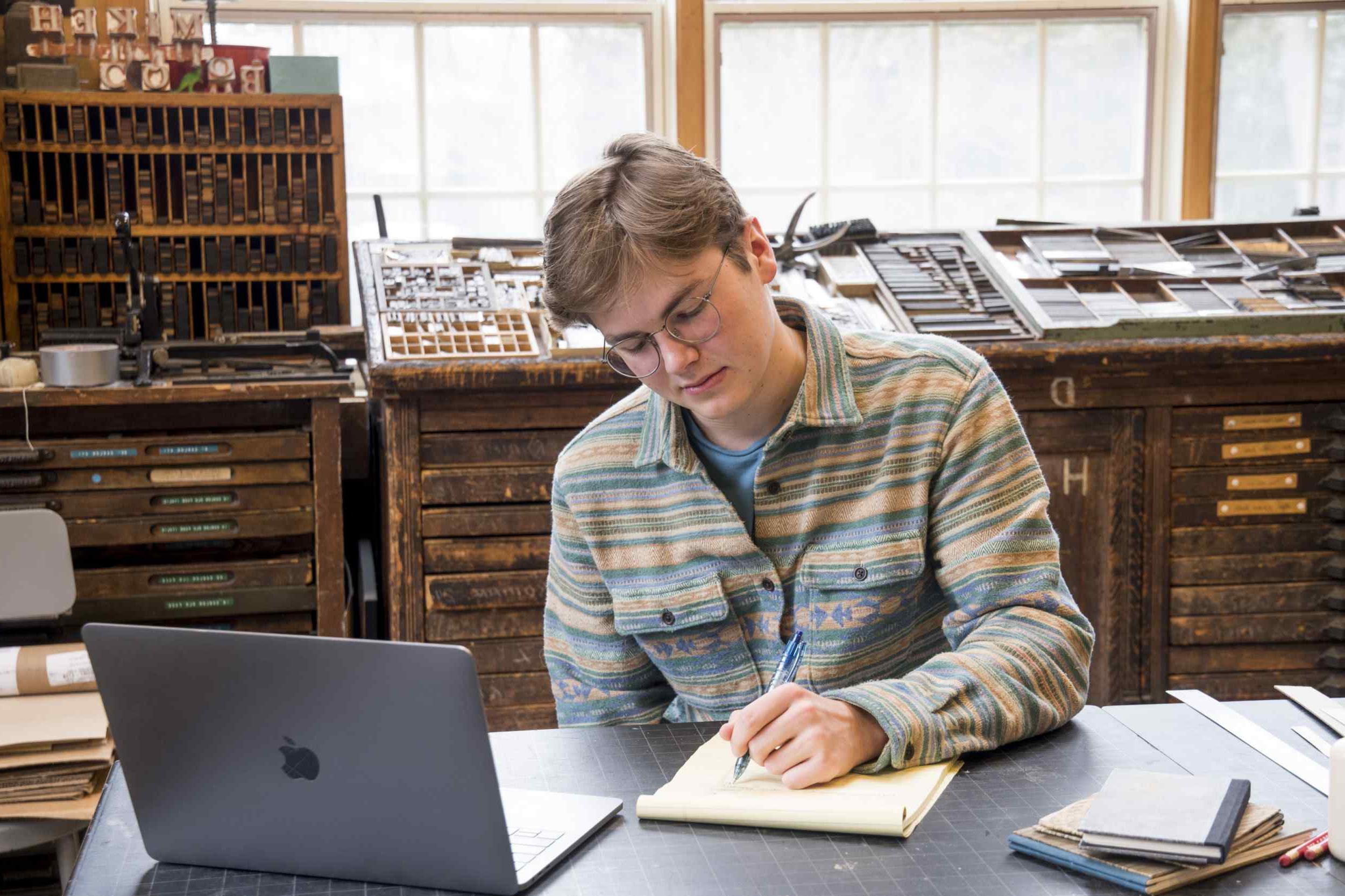
LEARN BY DOING
- Screener, Cherry Tree Literary Journal
- Managing Editor, Washington College Review
EXTRACURRICULAR ACTIVITIES
- Writer's Union
- Club Tennis
SUPPORT FROM DONOR PROGRAM
- The Hodson Trust

A Writer of Promise
Justin Nash
Class of 2021 • Smyrna, DelawareLEARN BY DOING
- Managing Editor, Washington College Review
EXTRACURRICULAR ACTIVITIES
- Writer's Union
- Club Tennis
SUPPORT FROM DONOR PROGRAM
- The Hodson Trust
Justin submitted an essay he wrote for his Introduction to Creative Writing class with James Hall, associate professor of English and director of the Rose O’Neill Literary House. In December 2019 Justin heard that “Moments Suggesting this Body Does Not Always Belong to Me” was a runner-up for the 2018 Norton Writer’s Prize. His work—a series of 29 vignettes—was published on Norton’s website later that spring.
“I was trying to compile a list of moments when I felt restricted or didn’t have full control of what I was doing or had to conduct myself in a way that I wasn’t comfortable with,” he explains. “Through the order of them, I wanted to create a narrative of bodily autonomy.”
The judges were impressed. “Using an innovative form, imagery, and dialogue, the writer creates an evocative piece that helps readers reflect on bodies, identity, and control,” his acceptance letter states.
Flash forward to his senior year and Justin’s resumé has only grown more elite. From interning with the prestigious Copper Canyon Press, which was part of his Cater Society for Junior Fellows research project exploring how public funding allowed non-profit publishing to differ from corporate, to being hired as a consultant at the Fine Arts Work Center in Provincetown, MA after a summer internship, Justin is excelling in all areas of editing and publishing.
As an intern for the Fine Arts Work Center Justin worked closely with 24PearlStreet, FAWC’s online workshop program, supporting famous writers and visual artists who taught online classes, and gained experience with outreach and donor management for the program.
Now as a consultant for the Fine Arts Work Center, Justin is helping develop a new online learning platform, a project that was in the works before the COVID-19 outbreak and has since moved to the forefront of the nonprofit’s priorities. On 24PearlStreet’s website you will find that this fall their classes are on hiatus as the team focuses on creating a platform that allows students “to focus on their writing—not the technology they’re using.”
Justin is a key player in this mission, using his prior experience with web design and educational workshops like Washington College’s Cherry Tree Young Writers’ Conference to bridge the gap between the webmaster and program manager.
On campus Justin has taken leadership positions in just about every campus publication throughout his four years. Justin is currently Editor-in-Chief for Collegian, WC’s literary journal, where he is navigating publishing virtually and creating a way to make the upcoming 10th anniversary of Collegian’s move from newsprint to bound book extra special.
“Putting together the first issue of The Collegian is what has made me the happiest [so far].” Justin said in reference to being Editor-in-Chief, “The staff issue is a trial run to make sure the team knows what to do and learns to depend on each other, but it always comes together so well. For issue 32.1 I was afraid something was going to fall apart—out of my own anxiety—but the day it was published I read it all the way from the editor’s note to the end and it was so exciting. That friday morning seeing it go live made me so happy.”
Issue 32.1 is the first student issue of the year and can be found online at collegian.gofuya.com. Justin’s editor’s note describes that the issue “contains works of visual art, poetry, and prose that plumb the depths of hope, loneliness, fear, identity, and companionship.”
To encompass all that Justin has learned over the past four years, his Senior Capstone Experience “And Can You Imagine? Being So Close to Nothing: The Young Guard of Queer Poetics,” confronts the incredible proliferation of poets writing around sexuality in recent years who are completely untethered from landmark traumas like the AIDS crisis. Where older queer poets have tended to focus on grief, longing, and guilt, he argues this new crop can’t be pinned down—writing in and around as many spaces as they have the newfound potential to inhabit. One of few commonalities among the poets is a marked use of the second person, which Justin will be close reading as an indicator and effect of this quantum, uncertain potential.